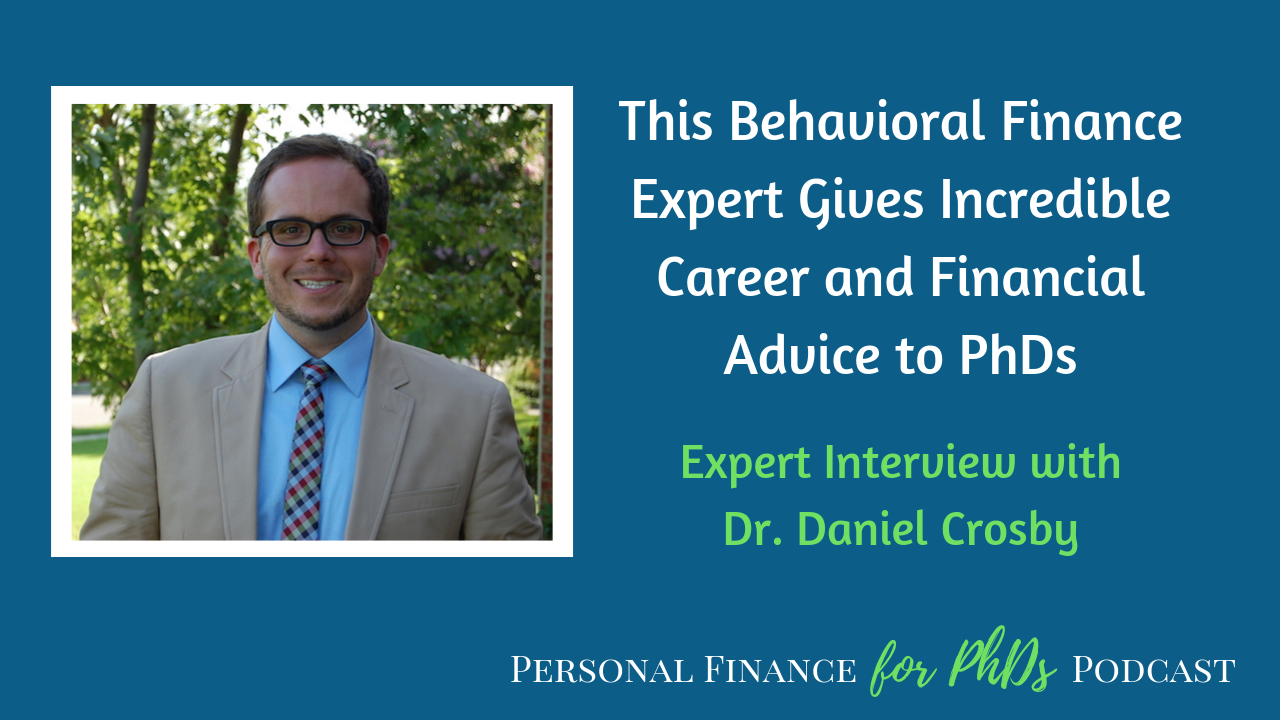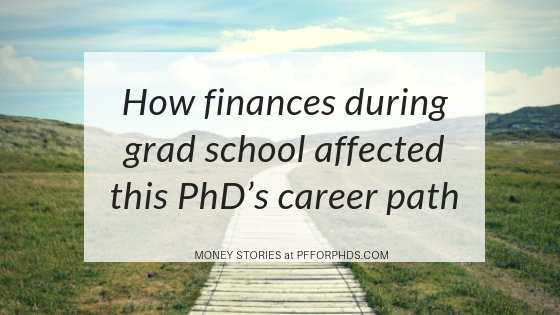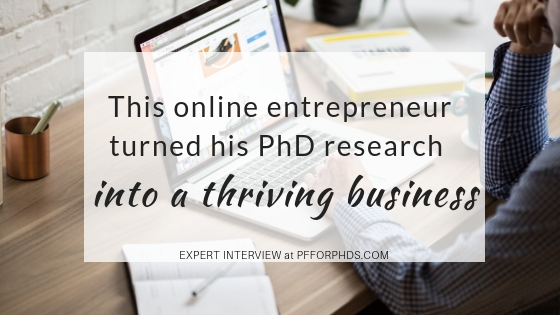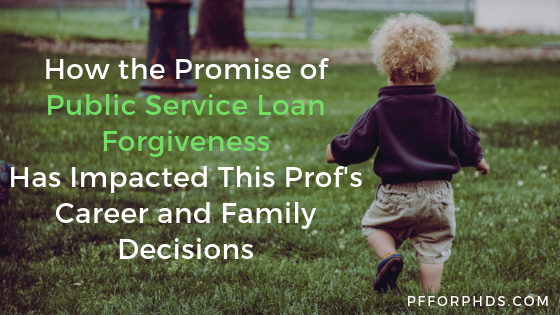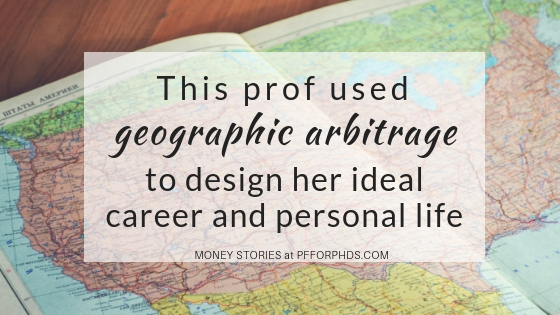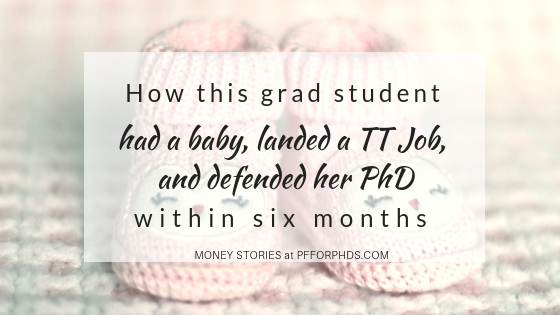In this episode, Emily interviews Dr. Daniel Crosby, an author and expert in behavioral finance. Upon completing his PhD in clinical psychology, Daniel realized for the first time that an academic salary would not afford him the lifestyle he wanted. He instead pivoted to translating the academic research in behavioral finance for working financial advisors, and he currently serves as the Chief Behavioral Officer for Brinker Capital. Daniel shares how he’s applied the principles of behavioral finance in his own life and specific career and financial advice for early-career PhDs, particularly those exiting PhD training.
Links Mentioned in This Episode
- Personal Finance for PhDs: Sign up for personal finance coaching
- Personal Finance for PhDs: Wealthy PhD group program sign-up
- Personal Finance for PhDs: Podcast Hub
- Personal Finance for PhDs: Subscribe to the mailing list
- Find Dr. Daniel Crosby on LinkedIn and Twitter
- Books by Dr. Daniel Crosby [These are affiliate links. Thank you for supporting PF for PhDs!]:
Teaser
00:00 Daniel: And rather than saying, “Oh, I’m a PhD in psychology, so let me do PhD in psychology things”, I thought, well, I know to have great conversations with people. I know how to run a training. I know how to read human emotion and human behavior and all of these things, when you conceive of them as building blocks, you can repurpose those building blocks in different ways and create a host of opportunities for yourself.
Introduction
00:34 Emily: Welcome to the Personal Finance for PhDs podcast, a higher education in personal finance. I’m your host, Dr. Emily Roberts. This is season four, episode eleven and today my guest is Dr. Daniel Crosby, an author and expert in behavioral finance. Upon completing his PhD in clinical psychology, Daniel realized, for the first time, that an academic salary would not afford him the lifestyle he wanted, so he pivoted to translating the academic research in payroll finance for working financial advisors. Daniel shares how he’s applied the principles of behavioral finance in his own life and gives specific career and financial advice and encouragement for early career PhDs, particularly those about to finish their PhD training. Without further ado, here’s my interview with Dr. Daniel Crosby.
Will You Please Introduce Yourself Further?
01:23 Emily: I have the pleasure today of hosting Dr. Daniel Crosby on the podcast. He is a certified expert in behavioral finance. I’m really, really pleased that he agreed to come on. And Daniel, will you please introduce yourself a little bit further and tell the listeners about the fantastic career you’ve had?
01:41 Daniel: Great to be here. Thank you for having me. I am the chief behavioral officer at Brinker Capital, which is a multibillion dollar asset manager based outside of Philly. There’s not many chief behavioral officers in the world, I guess, so by way of explanation, what I do is I create training, tools, and technology that help people make better decisions with their money. I am a clinical psychologist by education, but really haven’t spent any of my professional career in a clinical setting. I quickly learned in grad school that I loved thinking deeply about why people do the things they do, but I didn’t love working in a medical setting. I’ve looked for business applications of the thing that I studied, and I know you know what it’s like to pivot, so my career has been wild and crazy, but it’s been a great one.
Going from Psychology PhD to Chief Behavioral Officer
02:39 Emily: Can you take us back? Tell us more about your education and at what point you decided that you weren’t actually going to go that traditional, clinical route with your degrees?
02:50 Daniel: My undergrad was in psychology. Loved it. I’m the son of a financial advisor, so I went into school thinking I would study finance and be a financial advisor. Took some general ed courses in psychology and just absolutely fell in love, knew that that’s what I wanted to do, started my PhD three days after I finished my bachelor’s. I was really just on a good path to get going with this. But about three years into my doctoral program, I had just kind of had enough. I don’t think I’m wired to listen to 40 hours a week of heavy stuff. It’s hard to be that empathetic. It’s hard to not let that bleed into your own life and your own wellness, and I was just really taking my client’s problems home with me, candidly. And I said, you know, this is just a lot. The final nail in the coffin for me though, I was still sort of on the fence as I was wrapping up my PhD, I had an inkling that I would like to apply this in a business setting, but wasn’t quite sure how, so I interviewed for a dual appointment position at a local university, which would have been half teaching, half counseling and the pay was so bad. I got offered the job and the pay was just so ridiculously bad that when I sat down and did the math with my wife, I was just, there’s no way this can work. I think it’s instructive that I, as the son of a financial advisor, someone who is interested in finance, finished an entire PhD, kind of never doing the math on how the thing I was studying would put food on my table. That’s sort of an embarrassing, but true story, is to get to the end of this road that I was passionate about and then go, “Oh, well geez, what am I going to do with this?” So then I was sort of left scrambling with how can I actually make a living at this thing I’ve just spent eight years studying.
05:05 Emily: I think that’s going to be a very relatable story to a lot of people in the audience of hearing that advice, follow your passion and doing it, and doing it at a high level, and getting to the end of it and saying, “well, now what do I do?” In your case, it was because the dual position that you applied for was not attractive, financially. That could be the reason, certainly for people in the audience, why they don’t continue on the expected career path. But for many people who want to go into academia, it’s just that the jobs aren’t there. That’s the main problem is that there’s just no jobs to be had or very, very few, and so they end up having to look elsewhere. So super, super relatable story there. Would you mind me asking, was your graduate degree, did you go into debt for that or was that paid for, was it a combination?
05:52 Daniel: It was paid for. PhD programs in psychology are very selective, they’re very small, so there were only like five people in my cohort. If you get in, it’s paid for through assistantships. Then, through nothing but luck, I had parents who were in a position to support me in other ways. My parents kept the food on the table and a roof over my head, and the tuition itself was paid for, so I came out with no debt.
06:26 Emily: I see. So when you were sitting down to do that salary calculation, it wasn’t debt that was necessarily causing your initial needed number to rise, but rather just simply the cost of living and supporting your family and so forth.
06:39 Daniel: Yeah. It wasn’t debt. It was just like, “wow, I’m going to work forever.” It was crazy because it paid less than a kindergarten teacher. You go teach at a high level, at a college, go to all this school and you should have just taught first grade. The pay was much better, if you can believe it, and I think you probably can. That was just a shock to me. I had never really put pen to paper about how the jobs that were available to me would coincide with the kind of life I wanted to live. Then the other thing is, as you said, so many of the jobs — I was lucky to get a job offer in my hometown — but you know, many, many times you’re forced to move to someplace you don’t want to live or somewhere very out of the way to start your career. And that’s its own set of trade-offs, certainly.
07:34 Emily: When you decided, “okay, that’s not a viable route over there, I have to pivot and do something else,” ten or so years later, you’ve come to this point where you’re the chief behavioral officer somewhere.
What is Behavior Finance?
Emily: I want to hear more about what behavioral finance is and did that exist as a field when you came out or have you been part of developing that? What’s been the transition both for your career and also for that field over that time?
08:00 Daniel: Great question. I got out and I said, “look, I need to pivot to something that is a little better for my sanity and is also a little better paying.” I began to explore jobs in organizational behavior, organizational psychology, behavioral economics, behavioral finance, and really, no one would take a chance on me because this is 2008 and the economy’s not exactly fantastic. I’m out there, 29 years old looking, looking for a job and I’m applying for jobs in fields where I candidly have no experience, because I have this PhD in clinical psychology and they go, “well, this is, you know, industrial psychology or organizational psychology.” And so I got a lot of doors slammed in my face. And really it was just luck. I applied at an organizational behavior firm where the boss, the founder of this firm had a clinical background and had sort of made his way in the world. My story resonated with him and he saw enough potential there to take a chance. Again, I think anyone who has any modicum of career success can point to times in their career where they just got lucky. That was certainly one for me, where he saw himself in me, took a chance on me and knew what it was like to be in my position, because I just wasn’t getting a look at most places because I didn’t have the right sort of psychology background.
09:47 Daniel: In terms of the field of behavioral finance, behavioral finance is just sort of the study of finance that incorporates the messiness of human beings. A lot of standard financial and econometric models are based on simplifications of human behavior that make humans look more rational than they really are. Behavioral finance is just finance with human irrationality factored in and talking about the way that we make quirky decisions with our money. This was a field that was around. Not too many years later they gave out a couple of Nobel prizes for it. The good thing for me, sort of the niche that I found, was there were people out there charging $200,000 an appearance. These Nobel prize winning folks were out there charging a $100,000 to $200,000 every time they gave a speech and multimillion dollar contracts for consulting, but there was no one that was more affordable and there was no one that was more applied. There just weren’t many people doing more reasonable applied behavioral finance work and taking these great ideas that these folks had come up with and taking them out of the ivory tower and putting them on the desks of everyday people or everyday financial advisers. That’s sort of where my niche — my niche became being the more affordable, more practical options.
11:23 Emily: But it sounds like what you were doing was really taking academic research and translating into what can be then used on the ground by, as you said, advisors and perhaps other people, is that right?
11:35 Daniel: Yeah, that’s right. I mean that’s been sort of the trajectory of my whole career is as an intermediary between people who are much smarter than me and people who haven’t been exposed to these ideas. I sort of view myself as a translator to take these ideas, this research, and make it speak to the lives of everyday people.
11:57 Emily: This actually reminds me, from what you were saying, of my physics training, which is what I did my undergraduate degree in, where you basically assume that everything is a sphere, so the calculations are actually manageable because if you actually look at what things are, real shapes and so forth, it’s just the math is completely beyond what’s possible. Of course, not everything is a sphere, but you have to assume they are to make the math work. It reminds me of that.
12:23 Emily: I am curious if anything in your personal history — going through the PhD process and then, and then coming out as an early career PhD, and this job search and so forth — has any of that informed the work that you’re doing now within behavioral finance? Any of that personal stuff informing that?
12:41 Daniel: I don’t think so, really. I don’t think that really informs a ton of what I do from day to day. It probably informs my parenting more than my work. I have three young children and my wife and I talked, that as we raise them, I’m just trying to give them a more expansive look at the world of work and maybe a more detailed look at finding the sweet spot between following your passion and doing work that gives you the kind of life that you want. Because one thing that my studies have shown me is that we all measure what normal is on a relative basis. This is true of everything from mental health to wealth. Normal for you is financially is just kind of what you grew up with, so I think you need to be candid with your children about how they grew up and what normal is and what normal isn’t. So yeah, it probably impacts the way that I parent more than more than anything else.
13:51 Emily: Gotcha. What about the reverse ways, from taking what you’ve been learning about personal finance and behavioral finance since you pivoted into that field? Have you taken any of what you learned and applied it in your personal life or were you already kinda there with what you grew up with your particular parents?
14:09 Daniel: Yeah. What’s interesting is I have applied a lot of what I’ve learned from behavioral finance into my own life. But one of the primary ways that I’ve done this is by knowing what I don’t know. I remember, and I think every PhD has this experience, I remember I started my program when I was 23 years old. I start this PhD in psychology, 23 years old, thinking I know everything, get out a couple of years later and I’m like, did I learn anything? I feel like I know less than I did before. I think I have more questions than answers now. Especially when what you’re studying is something as hard to get your arms around as human behavior, you never quite get good at it. One of the primary things that I’ve learned from my years of study of finance is that nobody really knows anything and that knowledge is a weak predictor of behavior. I work with a financial advisor myself. And not to toot my own horn here, but I think when it comes to knowledge of markets and things, I probably know more than my advisor, but that’s not why I pay him. I pay him to keep me out of my own way. I pay him to be a barrier between me and the sort of bad behaviors I study because I know that simple knowledge of the sort of biased, irrational poor behavior that I study is a weak predictor of doing the opposite. I know I’m no better than the next person, no matter how many books I write on the subject. I take pains to diversify, to keep my fees low and to work with someone who will keep me out of my own way.
16:01 Emily: Yeah. I think this is something that’s maybe not well understood by the public. That you may be paying an advisor for expertise — you are not necessarily, but someone else may be — but an even more important role is, as you just said, to kind of talk you off the ledge from carrying out bad behaviors that you’re inclined to do as any human naturally would. You’re specifically talking right now within the realm of investing, is that right? Or does your advisor help you with other decisions as well?
16:31 Daniel: He does help me with things around, you know, the purchase of a home. He’s sort of a sounding board for things like college savings for my kids, the purchase of a home. But I’m primarily focused on investing and investing professionally is my primary focus.
Commercial
16:53 Emily: Emily here for a brief interlude. As a listener of this podcast, every week you hear strategies that another PhD has used to improve their financial picture. But listening and learning does not automatically translate into action in your own financial life. If you are ready to change how you think about and handle your money, but need some help getting started, I can be of service. There are two main ways you can work with me to create and implement a financial plan tailored for you. First, I offer one-on-one financial coaching, either as a single session or a series, as you make changes over the long term. You can find out more at PFforPhDs.com/coaching. Second, I offer a group program called The Wealthy PhD that is part coaching, part course, and part community. You can find out more and join the wait list for the next time I open the program at PFforPhDs.com/wealthyPhD. I believe it’s possible to succeed with your finances at every stage of PhD training and throughout your career. Let’s figure out together how to make that happen for you. Now, back to the interview.
Human Emotions and Financial Decisions
18:08 Emily: Is there anything else that you have learned, and then applied in your own life, aside from putting a bit of distance between yourself and being able to make a fast decision?
18:18 Daniel: Well, one of the hallmarks of behavioral finances talks about overcoming emotion. A lot of what we talk about is how do we keep people from making these emotionally laden decisions, but one of the other things you learn when you’re studying human behavior is that it’s always easier to roll with a behavioral tendency than to push against it. There’s cool research that shows that people who look at a picture of their children for five seconds before making a financial decision save more, are more likely to stay the course, et cetera. Similarly, we find that people who invest in ways that are aligned with their own personal preferences around the world that they want, in terms of social issues, environmental issues, tend to be better behaved. So I’ve tried to build some emotion into my process. I’ve tried to keep the things and the people that I love at the front of my mind and central in the planning and investing process, and I’ve tried to invest in a way that’s consistent with my values, because I think that it makes it a little stickier than say owning the S&P 500. It just personalizes it a bit. I think that those are both powerful ways to make investing a little more fun, to make the investing and planning process a little more personal and to bring about some good behavior in the end as well.
19:51 Emily: I really love those suggestions. I think I’ve also, maybe in the similar vein of looking at a picture of your children, I’ve heard that if you look at a picture of yourself aged up, you make different decisions. Is that right?
20:04 Daniel: That is right. Yeah. One of the things you learn a lot about in behavioral finance is salience and salience is just the ease with which you can sort of imagine or tap into a situation. As I sit here, I’ll be 40 next week, so as I sit here at nearly 40 years of age, it’s hard for me to imagine 80 year old Daniel, right? The idea of a guy who walks with a cane and has gray hair and stuff, it feels a little remote. People have found that if you age your face, you’re basically making it a more visceral experience to imagine yourself as this 80 year old version of yourself, it brings about better behavior. Again, that’s an imperfect example of how you imbue the process with a little emotion to help you make the right decision.
20:56 Emily: I actually had a client asked me recently what I thought about the particular RoboAdvisor Ellevest and she followed that up with, well, I’m really passionate about women and empowering women and all these things that were sort of in line with Ellevest’s mission. And I said to her, well, it sounds like you’re really excited about that, so I think they’re fine and go for it. Because, as you were saying earlier, if it it lines with her values, that particular manner of investing, she’ll probably be more likely to throw more money at it, engage with it more, and have a better outcome. Is that right?
21:27 Daniel: Yeah, that is. Without speaking to the particulars of Ellevest, I don’t know all the ins and outs of it enough to say one way or the other, I have a lot of respect for Sallie Krawcheck who heads up a Ellevest. But in general, you’re more likely to contribute to, and stay the course in your women’s leadership fund than you are your S&P 500 fund because it’s personalized, it’s tailored to you and your values and, not making any promises here, but there is also research to suggest that the kind of companies folks like Ellevest seek out, companies that have better female representation on boards and things, there’s historical research to suggest that those companies have outperformed the broad market, at least historically. I think there’s every reason to try and personalize your investing to your own preferences, feel like you’re doing a little good in the world, and if that helps to animate you to stay the course or to set aside a little money, both of which are very psychologically difficult, more power.
Behavioral Finance Strategies for the PhD
22:35 Emily: Absolutely. Yeah. Another question here. We’ve started to get some insights into this behavioral finance stuff, maybe for the general population, but I’m wondering if you see that there are any personal finance pitfalls that you think PhDs might be particularly susceptible to falling into, and then what strategies might there be to not do that?
22:59 Daniel: I’ve observed — I’ll speak to psychologists, doctors of psychology in particular, but I think that this probably applies to PhDs broadly — a lot of times we get a PhD because we want deep domain-specific knowledge, right? We get into this because we love it. We want to be the best in the world at it, but almost every position needs a bit of business savvy, and I think that we have more power than we realize. I think this power takes a couple of forms. I think first of all, you need the power to negotiate a salary. That first job you get is more predictive of your ultimate wealth than just about anything else, because it benchmarks every subsequent salary conversation. Being comfortable negotiating that first salary — I remember that first job, you feel lucky just to be there. You beat out 20 other talented people to get the offer, but don’t be afraid to know your worth and to negotiate that salary. I would say PhDs need a little business training, because we have this deep domain-specific knowledge, but we don’t know, sometimes I feel like, how to do more practical things. I think get a little bit of business knowledge.
Daniel: Then a third thing and I would say the thing that has probably served me best in my career, financially, is to just think creatively about your role. If I had stayed on the prescribed path of being a dual-appointed college counselor, I would make a fraction of what I make now. Because I thought expansively about the things that I learned in school, and rather than saying, “Oh, I’m a PhD in psychology, so let me do PhD in psychology things” I thought, well, I know to have great conversations with people. I know how to run a training. I know how to read human emotion and human behavior and all of these things, when you conceive of them as building blocks, you can repurpose those building blocks in different ways and create a host of opportunities for yourself. Rather than thinking about one prescribed path, think about your education as a series of building blocks, a series of competencies that you can repurpose in any number of ways to do a host of different things. Finally, I would say don’t be scared to get out of academia. Because when I was in academia, you’re a face in the crowd, you’re one PhD among many. But when you get out in the real world, when you get out in the business world, you’re special and people respect your expertise in a way that they might not necessarily in a university setting. Lots to be said for a university setting of course, but I think don’t be scared to get out there to try something new and to know your worth.
Dealing With an Income Increase Post-PhD
26:20 Emily: Such wonderful advice and you put that so well. Thank you. I’m wondering if you have any advice for a person in this situation, which is something that you went through, which is a person who is about to come on a large income increase? They’ve been in training, grad school, postdoc, whatever it might be, and now they’re going out there and doubling or tripling, or more, their salary, potentially in industry, or similar. What behavioral finance concept should that person know about and be applying in that situation?
26:50 Daniel: This is a great question. The concept to know here is what’s called the hedonic treadmill, which says that, as our earning increases, our consumption or spending tends to increase in ways that are commensurate with the increase in earning. And then you never feel richer. You never feel better off because your lifestyle has risen as fast as your income. My number one piece of advice here would be to not let your lifestyle rise faster than your income and to make sure that as your income increases, so does the amount you’re setting aside, because lifestyle creep is a really, really big problem. What’s fascinating is, and I’ve been certainly bitten by some of this and haven’t followed my own advice here in certain instances, but the things that seem so extraordinary to you — I think about my house; when we bought this house it was the most beautiful house I had ever seen and soon it’s just where you throw your dirty socks — it just quickly becomes the backdrop against which you live your life. So really watch out for lifestyle creep. Make sure that if your income increases 50%, that your spending only increases 25%. Have a little fun, but make sure that they don’t increase in lockstep because that’s not where happiness is.
28:26 Emily: Yeah. I guess, I think I would add onto that — you put it very well about how the hedonic treadmill operates — I think that for some PhDs, when they get out of training and they finally have that larger salary, there’s some pent up demand. There’s some pent up wanting to spend behavior because they have been on this constrained income for so long. My advice to that person, in addition to what you said, would be to splurge on something that’s a one time expense, like a grand vacation or something, and not upgrade your housing this high degree, not upgrade your transportation to a high degree, not upgrade those fixed or recurring expenses in your life, but rather have this one wonderful, pleasurable experience and then get back to a lifestyle that is, as you were saying, far below what you could actually “afford” with your new salary, just so you aren’t stuck on that treadmill over the long term.
29:15 Daniel: I love that advice and I think it’s also consistent with understanding how you can spend money in ways that make you happy. When you look at the research on how to spend in ways that makes you happy, giving money away makes us happy, spending on experiences makes us happy and spending on getting rid of stuff we hate doing makes us happy. Having someone mow your lawn for example, makes happy. Buying time, buying experiences, and giving for goodwill — these are the things that make us happy. Don’t go buy a fancy car. Don’t go buy a big house that’s going to lock you into this recurring expense trap and it’s not even going to make you feel any better. It’s a trap.
Last Words of Advice and Where to Find Dr. Daniel Crosby Online
30:01 Emily: It’s great insight. Thank you. Do you have any final pieces of advice? We’ve already heard so much, but anything more for that early career PhD in terms of personal finance or behavioral finance advice?
30:11 Daniel: Again, just really to know your worth. I felt like when I broke out of my swim lane and got out of the cattle call that was sort of herding me towards this very prescribed life and once I sort of broke out and got into the world, I found that people had a lot more enthusiasm and respect for my ideas than they might have in a more constrained academic setting. So know your worth, don’t be afraid to ask for what you’re worth and go get ’em.
30:46 Emily: Wonderful. And if listeners want to follow up more with you, want to learn more from you, read your books, listen to you, where should they go?
30:54 Daniel: Yeah, I’d encourage folks to check out my books. The Laws of Wealth* is probably the place to start, The Behavioral Investor* is next. I’m super active on LinkedIn and Twitter, @danielcrosby.
[* This is an affiliate link. Thank you for supporting PF for PhDs!]
31:07 Emily: Thank you so much, Daniel, for this interview.
31:10 Daniel: My pleasure.
Outtro
31:11 Emily: Listeners, thank you for joining me for this episode. PFforPphDs.com/podcast is the hub for the Personal Finance for PhDs podcast. There, you can find links to all the episode show notes and a form to volunteer to be interviewed. I’d love for you to check it out and get more involved. If you’ve been enjoying the podcast, here are four ways you can help it grow. One, subscribe to the podcast and rate and review it on Apple podcast, Stitcher, or whatever platform you use. Two, share an episode you found particularly valuable on social media or with your PhD peers. Three, recommend me as a speaker to your university or association. My seminars covered the personal finance topics PhDs are most interested in, like investing, debt repayment, and taxes. Four, subscribe to my mailing list at PFforPhDs.com/subscribe. Through that list, you’ll keep up with all the new content and special opportunities for Personal Finance for PhDs. See you in the next episode, and remember, you don’t have to have a PhD to succeed with personal finance, but it helps. The music is Stages of Awakening by Poddington Bear from the Free Music Achive and is shared under CC by NC. Podcast editing and show notes creation by Lourdes Bobbio.
